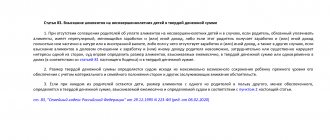Basic Concepts
Alimony relations between spouses, including former ones, are regulated in Chapter 14 of the Family Code of the Russian Federation. Article 89 of this regulatory act lists an exhaustive list of people who have the right to seek from a spouse who has the necessary financial capabilities the payment of alimony benefits.
These individuals include:
- A spouse who, due to physical or psychological factors, is unable to work and at the same time needs financial support.
- A pregnant wife or a woman caring for a child under 3 years of age.
- A needy parent caring for a child who is disabled until he reaches adulthood or disabled in group 1 from birth.
- The needy spouse is a pensioner;
- Disabled parents - from their adult and able-bodied children.
The main criterion for requesting financial assistance in this case is need. This term is not specified or exhaustively defined in any regulations, therefore it is determined independently in each individual case, by comparing a person’s income and expenses necessary for his normal existence.
A special class of needy spouses includes a husband or wife who is classified as a disabled person. Alimony relationships between these persons and their former spouses are distinguished by the fact that there is no interest in them for the children.
Also, a spouse who becomes disabled both during marriage and within 1 year after divorce has the right to demand maintenance for himself.
Example: Marina P. filed a lawsuit against her ex-husband, indicating that as a result of an accident that occurred during the marriage, she was assigned disability group II and could not fully support herself. In this regard, she asked to collect alimony in the amount of 15,000 rubles monthly from her ex-husband.
The court found no grounds for satisfying the claim because:
- The plaintiff is employed in a private company, her income is twice the subsistence level in the region;
- The plaintiff also receives additional income from renting out apartments and non-residential premises;
- Interest from the bank deposit is transferred to her account monthly;
- Her total income is twice the income of her ex-husband, while the husband’s dependent child is from his first marriage;
- The costs of treatment and rehabilitation procedures presented to the court and confirmed do not exceed even 1/6 of the plaintiff’s total income.
Thus, the court did not see the need for help and rejected the ex-wife’s claim against her ex-husband.
Disability of I, II, III groups and alimony
If the person paying alimony is disabled, then this situation is considered separately by law. Since disability does not relieve financial obligations in raising and maintaining a joint minor child. Alimony payments are withheld from benefits if the citizen does not work, and provided that the citizen works, they are calculated from the amount of wages.
The court may order alimony to be paid in a fixed amount if disability benefits are the only source of income of the alimony payer; if he receives temporary disability benefits, the court may review the form of alimony and make adjustments.
If health allows other life circumstances, many citizens whom MSEC recognizes as disabled receive social support from the state in the form of pensions and try to find work
Does the law provide for the payment of alimony in such a case?
In Art. 102 of the Federal Law of the Russian Federation of December 15, 2001, number 166-FZ. The detailed statutory concept of incapacity for work is indicated.
According to the law, disabled citizens are considered disabled citizens who can carry out labor activities in a way that is not directly prohibited, in connection with the law on constitutional human rights.
A working disabled person has the right to petition for payment of alimony from his spouse, but at the same time he can continue to work, in this case it is worth paying attention to paragraph 1 of Art. 93 of the RF IC, which explains that only the needy spouse can receive alimony, regardless of whether he is disabled or not.
In this case, the court must provide documents about insufficient earnings and a disability pension to prove the status of need. Taking into account the evidence provided, the court will make a decision without relying on marital status.
A disabled person has the right to collect alimony for his maintenance both during marriage and after divorce: Chapter 14 of the RF IC (Articles 89-92).
Marriage gives spouses not only rights, but also obligations and the need for each to contribute to the family budget.
The court will consider:
- the defendant’s financial ability to help his spouse;
- the amount of income will be taken into account;
- special family circumstances, especially if there are dependents.
In divorce proceedings, a mandatory condition for the requirement of alimony payments, in addition to need and incapacity, must be the occurrence of disability during the marriage, and within one year from the entry into force of the divorce decision.
The court considers each situation individually, taking into account all the evidence provided by the parties.
Grounds for paying alimony to disabled spouses
As noted above, a person who is disabled and in need can count on financial support from an ex-husband or wife.
In accordance with international and Russian legal norms, disability is the loss or limitation of the opportunity to participate in public life on an equal basis with other people.
It follows from this that any person who is unable to work can be considered disabled.
Moreover, if we proceed from judicial practice on alimony disputes between spouses, then Russian courts recognize the following as incapacitated for work:
- men over 60 years of age;
- women over 55 years of age;
- disabled people of groups I, II and III, after they have been recognized as such by a medical and social examination.
When receiving alimony for a group 3 disabled person, it is necessary to take into account the fact that these persons are quite capable of working and, accordingly, supporting themselves. Only if the VTEK (Medical Labor Commission) does not recommend that a person engage in labor activity, he can demand maintenance. At the same time, by the way, the exemption of disabled people from paying child support is not provided at all.
Based on norm 92 of the RF IC, the grounds for exemption from the burden of paying alimony can be:
- Alcohol or drug addiction of the alimony recipient, which has caused disability. Must be confirmed by medical documents.
- The recipient committed a crime that resulted in incapacity. It is permissible only if there is a court-issued sentence that has entered into force.
- Short duration of family relationships (based on judicial practice, this period is within 1-5 years).
- Unworthy behavior of a wife or husband demanding payments: infidelity, riotous lifestyle, long absence from the family, beatings, etc.
- Entry of a disabled spouse into a new family relationship.
- Another nuance is the transfer of property by a disabled person upon concluding an agreement on lifelong maintenance; in this case, the alimony payer may be completely exempt from payments, since the ex-spouse will receive financial support from other persons.
Alimony relationships cannot arise between cohabitants, since the basis for acquiring the obligation to care for the spouse appears only upon marriage in the registry office. The so-called “civil marriage” is not regulated by law in any way and does not give rise to either alimony obligations, inheritance rights, or a regime of joint property of the spouses.
In addition, when assigning monthly alimony, the court does not take into account either the date of onset of disability (this condition can occur both during the marriage relationship and before its conclusion) or its cause, unless it is expressly specified in family law.
When alimony is not collected
The right to alimony for adult citizens is not unconditional. In addition to the lack of grounds for receiving them, the law provides for the following reasons for refusal (Article 92 of the RF IC):
- if the disability was the result of alcohol or drug abuse. Also, a person whose disability was the result of an intentional crime he committed cannot count on alimony;
- short duration of marriage. The law does not specify a specific figure; in judicial practice, a union that has existed for less than 3-5 years is considered such;
- misbehavior of the plaintiff during family life. Here the law also does not provide a decoding. According to established practice, this includes adultery, frequent threats and violence against other family members, drunkenness, waste of the family budget on gambling, etc.
Article 92 of the RF IC – Release of a spouse from the obligation to support another spouse or limitation of this obligation for a period
The court may release the spouse from the obligation to support another disabled spouse in need of assistance or limit this obligation to a certain period both during the marriage and after its dissolution:
- in the event that the incapacity for work of the spouse in need of assistance occurred as a result of the abuse of alcoholic beverages, drugs or as a result of his commission of an intentional crime;
- if the spouses are married for a short period of time;
- in case of unworthy behavior in the family of a spouse requiring payment of alimony.
One of these circumstances is sufficient for the court to refuse to award alimony to the plaintiff. However, the defendant will need to prove these facts. For example, with the help of witness testimony, a certificate from a drug treatment center or the police, etc.
Since there are no clear criteria for assessing immoral behavior, the judge makes the final decision based on the circumstances of the case and his own interpretation of the evidence presented. For example, the couple had been married for 10 years. For the past year, the husband has been cheating on his wife, which was the reason for the divorce. Whether such behavior is considered undignified is at the discretion of the judge.
Also, although this point is not directly stated in the Insurance Code, in judicial practice alimony is denied to a person who became disabled before marriage.
Amount, amount of alimony
When determining the amount of alimony for a disabled husband or wife, the following factors are taken into account:
- Availability of the disabled ex-spouse with the funds necessary for a normal existence.
- Does he need extra money to meet important life needs?
- The ex-husband and wife have dependents or common children.
- Do adult children provide financial assistance to a spouse in need?
The amount of alimony for an incapacitated ex-husband or wife can be determined in one of two ways:
- by concluding a mutual agreement that describes specific payment amounts;
- by decision of the judicial authorities.
Such financial support is only in cash and is paid in hard cash. In this case, the amount of payments is indexed based on the cost of living. Assigning maintenance as a percentage of all income from spousal alimony is not practiced.
If the region does not have the specified cost of living, indexation occurs based on the total amount for Russia.
Amount of alimony payments
Alimony for a spouse with a disability can be established in the following ways:
- court decision to collect alimony;
- spouses can draw up an alimony agreement; it will require notarization.
If an agreement cannot be reached, the applicant for alimony maintenance can go to court. To decide whether to satisfy or reject claims, the court will take into account the following factors:
- Financial situation and marital status of the alimony payer.
- The amount of money that is not enough for the creditor to meet his personal needs.
- The need for financial resources to meet basic and additional needs.
- Whether the alimony payer has the financial capacity to fulfill alimony obligations.
- Availability of financial assistance from adult able-bodied children.
Alimony maintenance for a spouse with a disability is assigned in a fixed monetary amount. In this case, the financial capabilities of both participants in alimony legal relations will be taken into account. When determining the amount of payments, the cost of living in the subject of residence is taken into account. The court may assign an amount equal to half, a quarter, a third, or another percentage of the subsistence level. Alimony payments must be transferred to the recipient's account monthly. The amount of alimony is indexed in accordance with changes in the cost of living.
Voluntary agreement on alimony for a disabled husband or wife
Concluding an agreement is considered more preferable for the parties to alimony relationships, since in this case each participant expresses his will freely, which means that the chances of conscientiously fulfilling his duties increase.
The contract specifies the following points:
- size and amount of maintenance (usually stated as a specific amount or as a percentage of the salary of the alimony provider);
- time interval between payments (monthly, quarterly or one-time);
- the procedure for indexing alimony, increasing or decreasing its size;
- features of payment of funds (sanctions for late payments; options for postponing payment, etc.).
All operations to conclude an agreement are carried out only in writing. A prerequisite is the presence of a notary.
However, there are legal problems in determining the legal status of the agreement. Often, the courts recognized the agreement as not concluded on the basis that the Family Code allows the conclusion of an agreement only in relation to children. However, Chapter 16 of the RF IC and the provisions governing the procedure and nuances of concluding an agreement on alimony do not contain restrictive norms and prohibitions on concluding an agreement between spouses.
In this regard, a former or married husband and wife can agree on alimony in favor of one of them through a notarial procedure.
Legal assistance
“Alimony” cases are very complicated. Wives want to get as much as possible, and husbands want to pay as little as possible. This conflict can be resolved in different ways, since the law allows the case to be considered from different positions.
Lawyers of the Prav.io portal strongly recommend that, before making a decision on legal proceedings, you at least seek advice. An experienced family lawyer will “sort everything out” and tell you which solution will be optimal - enter into an agreement or go to court.
And in cases where a peaceful resolution of the issue is impossible, it will help to correctly draw up a claim, collect and formalize evidence. A lawyer will effectively represent the client's interests in court. Legal assistance may be needed not only by recipients, but also by alimony payers.
How to apply to a disabled wife or husband for alimony during a divorce
People with disabilities are under special state protection. Based on this, a number of preferences and benefits have been established for this group of citizens, including when filing a claim for the collection of alimony payments in the event of a divorce.
Civil procedural law makes it possible for plaintiffs with disabilities to file an application in the court district that, in their opinion, is more convenient.
So, based on Art. 28 of the Code of Civil Procedure of the Russian Federation, the claim is filed in court at the place of residence of the defendant. At the same time, in accordance with Part 3 of Art. 29 of the Code of Civil Procedure of the Russian Federation, claims for alimony must be filed in the court that is located in the plaintiff’s territory of residence.
Statement of claim
There are no special requirements when preparing a statement of claim in the case of alimony claims through the court. You should carefully study the provisions of Art. Art. 131-32 of the Code of Civil Procedure of the Russian Federation and take into account their requirements when drawing up a claim.
IMPORTANT: Alimony for a disabled wife or husband can only be recovered through a claim. We do not apply the order procedure to these disputes, as stated in Art. 121-122 Code of Civil Procedure of the Russian Federation.
As a general rule, it should contain the following information:
- Name and address of the court;
- Information about the participants in the process: full name, full addresses of residence and official registration;
- Title of the claim;
- Description of the essence of the matter: when the marriage was concluded, whether it was dissolved, whether there is a joint household;
- Listing of legal acts regulating the controversial issue. You can provide links to judicial practice in similar cases;
- Information about evidence: information about the need for help; medical documents about the disease; VTEK certificate of disability, etc.
- Justification of the amount of alimony, its calculation and linkage to the subsistence level;
- Indication of duty exemption;
- Petition to the court;
- List of attached documents.
- Date and signature.
The claim is drawn up in two copies - one for the court, the other sent to the defendant by the court. When appearing in person in court to submit documents, you can take copy No. 3 with you for the court to mark the acceptance of the documents.
Going to court
If none of the previous options suits you, then you will have to prepare a statement of claim and other documents. You must include:
- a copy of the birth certificate;
- copy of passport;
- a copy of the marriage or divorce certificate;
- statement of claim;
- copies of receipts and certificates of expenses for the child.
In addition, the second spouse can submit documents from his side. If he is disabled, he will show the expert opinion in court. He can also list all his monthly expenses for doctors and medications. On this basis, the court may reduce the amount of alimony. If the defendant has children with other women, this will also affect the amount of payments.
USEFUL INFORMATION: How does the presence of alimony affect the repayment of loan debt and registration of a mortgage?
Sample claim
Even experienced lawyers are unlikely to be able to develop and offer a universal model for any situation when collecting alimony for a husband or wife with a disability.
Each situation is individual, as is the individual claim on this issue.
Ask a Question
You can use the sample below to prepare documents yourself, but do not forget to first consult with our lawyers.
Judicial order and procedure
If the ex-husband and wife cannot agree on the payment of alimony through an agreement, either party can file a claim with the courts. The statute of limitations does not apply to such cases, but the incapacity of a spouse arising after a divorce can be taken into account only no later than 1 year from the date of divorce.
More often, the initiator of legal proceedings is the alimony recipient if the alimony recipient refuses to voluntarily transfer part of his income to his ex-husband or wife.
The consideration of such cases in court is open and adversarial. The parties are obliged to explain to the court their point of view and requirements, supporting them with evidence.
In court, the plaintiff will have to prove:
- Need for additional assistance;
- Insufficient own income;
- Evasion of the former spouse from voluntary assistance.
The second party – the defendant – will accordingly refute all of the above circumstances.
Documentation
A former spouse who wishes to receive support must present evidence in court:
- Conclusion about the presence of disability.
- Certificate of own income.
- Certificate of income of the defendant (if possible).
- Receipts, receipts and other documentation supporting expenses.
- A copy of the claim (transferred to the defendant).
- Power of attorney in case of using the services of a representative.
In addition, it is necessary to provide the court with information about the dates of marriage and divorce, the presence of common minor children and the maintenance of the general family budget.
State duty and other expenses
The burden of paying fees in alimony claims rests with the defendant in the case. The amount of the fee he will have to pay directly depends on the price of the claim.
The fee for filing a claim for alimony is fixed - 150 rubles. But at the same time, according to the provisions of Art. 333.36 of the Tax Code of the Russian Federation, plaintiffs in claims for alimony are exempt from paying fees. This applies to any claims for alimony made in favor of any person.
In addition, persons with group 1 or 2 disabilities in accordance with norm 333.26 of the Tax Code are exempt from paying state duty, the burden of payment passes to the defendant.
Collection procedure
The responsibility to support children rests with all parents without exception. Some people believe that in case of disability there is no need to pay, this is absolutely not the right opinion. According to our laws, disabled people, like any other parents, are obliged to support their children financially.
If a citizen who has a disability was officially married, he can go to court to collect alimony in his favor. This can be done even after a divorce for five years.
USEFUL INFORMATION: Evicting an ex-wife from her own apartment
From January 1, 2021, disabled people will pay only 0.1% for each day of delay in alimony payments. Previously, penalties were 5 times higher and amounted to 0.1%. Also, starting this year, you can completely get rid of penalties in court. To do this, you need to declare your difficult financial situation.
In order to demand payment of alimony from a disabled person, several conditions must be met:
- paternity must be officially established;
- the child must be under 18 years of age.
According to the law, payments can occur in two ways:
- In a fixed size. This option applies if the debtor does not have official earnings. Thus, the court may order you to pay, for example, 5,000 rubles monthly for child support.
- In the second case, payments are assigned as a percentage of the monthly income of the alimony payer. The following rules apply here: - 25% must be given for one child; — for two 33%; — for three children 50%.
If a citizen who has a disability was officially married, he can go to court to collect alimony in his favor. This can be done even after a divorce for five years.
Procedure for paying alimony for a disabled spouse
The method and time period for alimony payments by one of the divorced spouses to the other depends on how the alimony recipient achieved such support.
If assistance was awarded through the court, then payments will be received once a month in a fixed amount, which depends on the cost of living in the plaintiff’s territory of residence.
IMPORTANT: Unlike maintenance awarded through court proceedings, assistance by agreement can be the transfer of any property (for example, an apartment, a summer house, a car), which can later be used by the alimony recipient to make a profit from the sale or rental.
The procedure for forced calculation of alimony for the husband or wife of disabled people of group 2 or group 3 is no different from the general conditions for collecting and withholding alimony for children.
If you refuse to comply with a court decision, you must:
- Obtain a writ of execution from the court to collect alimony.
- Send the writ of execution to the FSSP;
- Wait until enforcement proceedings are initiated.
Upon further reaching an agreement on voluntary payments, the claimant can always withdraw the writ of execution from the bailiffs. In this case, the debtor will pay maintenance on his own initiative.
If the financial situation of the parties changes, the interested party has the right to demand a reduction, increase in alimony, or even insist on the termination of its payment.
Example: Former wife Oksana Z., who has a group 2 disability, obtained through the court the recovery of alimony from her ex-husband. Their size amounted to 7 thousand rubles. At the time of the penalty, she did not have a job; for medical reasons, almost any work was contraindicated for her.
After 2 years of payments, the ex-husband filed a lawsuit to cancel the obligation to pay alimony. The claim stated that Oksana Z. currently works as the chief accountant in the company, her income is twice his own. Rehabilitation procedures as part of the treatment have been completed and the need for additional support has disappeared.
The court, having examined the case materials, sided with the ex-husband and canceled the alimony. The judge considered that Oksana Z.’s current income is sufficient to support her, she is currently able to work with some limitations, and her income level is three times the subsistence level for the adult population.
Termination
The writ of execution for alimony becomes invalid in the following cases:
- restoration of the claimant's ability to work. In this case, the payer applies to the court to terminate payments;
- change in the financial situation of the parties: the emergence of an additional source of income for a disabled person or a deterioration in the financial situation of the payer.
In the first case, payments stop regardless of whether the ex-spouse continues to need money. In the second, the judge's decision will depend on the circumstances of the particular case.
Term
According to Art. 107 of the RF IC, if there are legal grounds for collecting alimony, citizens can go to court at any time. There is no limitation period.
The duration of consideration of the case in court is up to 2 months. But the calculation and payment of alimony is carried out not from the moment the court makes a decision, but from the moment the claim is filed.
In some cases, it is possible to collect alimony for the past period of time – up to 3 years. To do this, the plaintiff must prove that during the specified period (up to 3 years) prior to going to court, he made unsuccessful attempts to obtain financial assistance from his ex-husband or ex-wife, and was refused. Evidence can include testimony, letters, online correspondence, and recordings of telephone conversations between divorced spouses.









